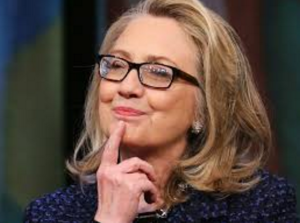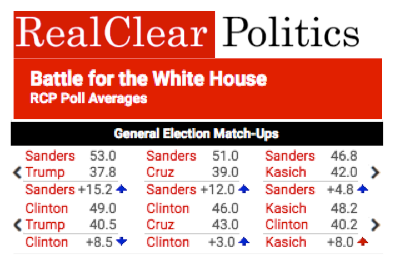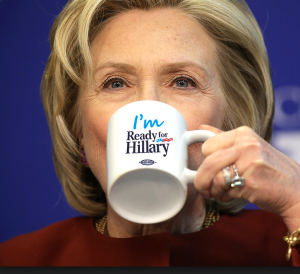 As a Sanders supporter, I concede there are many valid reasons to worry about him. But one of the biggest “go-to” criticisms used by Senator Hillary Clinton and her supporters strikes me as simplistic and overblown. More importantly, her focus on that issue makes me worry that she perhaps doesn’t truly understand what it takes to be an effective general election candidate and President.
As a Sanders supporter, I concede there are many valid reasons to worry about him. But one of the biggest “go-to” criticisms used by Senator Hillary Clinton and her supporters strikes me as simplistic and overblown. More importantly, her focus on that issue makes me worry that she perhaps doesn’t truly understand what it takes to be an effective general election candidate and President.
Before I get to that, here are just a few of the more valid reasons for being concerned about supporting Sanders: 1) You don’t think enough moderate voters will ever be willing to pay higher taxes to allow him to be elected in a general election; 2) You worry whether a perpetually shouting septuagenarian white guy is the best option for leading an increasingly diverse electorate that values charisma (see McCain v. Obama); 3) You worry that the term “democratic socialist” Sanders uses to describe himself is too toxic to attract swing voters in November; 4) You worry that if we don’t elect a remarkably well credentialed female leader like Clinton, the shameful White House glass ceiling will remain intact for a very long time.
Those are valid concerns. While I also have a list of concerns about Clinton, I do admit that Sanders is not an entirely safe political bet.
But one thing I’m not particularly worried about is his policy aptitude. Many Clinton supporters, and Secretary Clinton herself, have become obsessed with the notion that Sanders doesn’t have the necessary policy chops for the job. That certainly was an oft-repeated Clinton theme on last night’s MSNBC’s “town hall” broadcast.
As evidence, Clinton and her supporters continually point to her more detailed policy plans, or editorial board interviews in which Clinton shows a deeper grasp of policy detail than Sanders. For instance, many Clinton supporters have been pumping social media channels full of articles like this from Vox’s Matthew Yglesias:
“Hillary Clinton does a better job than Bernie Sanders at explaining the details of his bank breakup plan.”
I’ll be the first to admit, Sanders should have a stronger answer to questions such as “how would you break-up the banks.” After all, that is a marquee issue of his campaign.
At the same time, let’s keep all of this in proper perspective. These interview performances are hardly evidence that Sanders is not intelligent enough to be President. They aren’t evidence that he will fail to surround himself with advisors who are experts on such details. They’re not evidence that breaking up the banks is a regulatory impossibility. Therefore, they are not particularly strong evidence that Clinton would be a better President.
Moreover, maybe, just maybe, communicating on a less wonky level to lightly engaged voters is a more effective way to connect with them. After all, that approach has led to Sanders swiftly moving from being an obscure fringe candidate with almost no support to a serious contender for the nomination of a party he only recently joined. That approach also has led to Sanders polling significantly more strongly than Clinton in general election match-ups against Republicans, according to Real Clear Politics current average of major surveys. So maybe, there is something here Clinton can learn.

If the American people were interviewing Sanders as a candidate to become the nation’s lead banking regulator, his failure to go deeper into the regulatory weeds would concern me. But we are interviewing Sanders to be hired as the nation’s Chief Executive, a position that operates at a much higher level.
Think of it this way: The Obama Administration’s White House and Treasury Department is thick with brilliant, learned staffers who know much more about banking regulations and foreign policy than President Obama. But that doesn’t make Obama a lightweight, and it doesn’t mean those staffers are more qualified than Obama to be President.
The most important qualifications for a President to have are the right values and vision, the backbone to stick to that their values and vision, the communications chops to persuade the American people, the ability to enact the related policy agenda, and the judgment to react wisely to developments that we can’t yet foresee. Those things are infinitely more important than the ability to score the highest marks in the editorial boards’ Wonk Olympics.
At this stage, I realize my guy Sanders is not going to be the nominee. I can count. As the great Mo Udall said, “the voters have spoken, the bastards.” Therefore, I am, gulp, hereby “ready for Hillary.” Actually, given the alternatives, and given how much there is to admire about Clinton, this is not close to a difficult decision.
But Clinton needs to disabuse herself of the notion that the ability to spout policy details like a Spelling Bee champ is among the more important qualifications for President. Rather than smugly dismissing Sanders’ preference for addressing the American people on an inspirational and aspirational level, Clinton should have enough wisdom and humility to learn from Sanders’ approach. Doing so would make her a better candidate and President.

 A lot of liberals I know are privately not all that sure if they are “Ready for Hillary,” as the Clinton boosters put it.
A lot of liberals I know are privately not all that sure if they are “Ready for Hillary,” as the Clinton boosters put it.